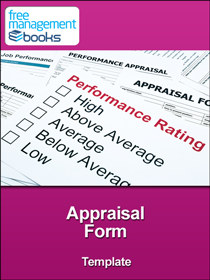Appraisal Form Template
 |
||
 |
||
This Appraisal Form template provides you with all the sections you need to review and record an individual's performance. You can enter the details of an individuals goals and competencies in terms of their attainment and performance assessment. It also enables you to detail all aspects of their development plan in terms of any training, coaching or mentoring. Finally you are able to record all the above details for the next review period.
Using goals as a measuring stick for the progress and accomplishment of your employees is not exactly a groundbreaking technique. In fact, managers have been using goal setting to motivate and evaluate employees for as long as there have been businesses to manage. However, it is amazing to see how many otherwise talented managers improperly use goals to track their employees. Likewise, many managers make the mistake of interpreting the results of the goal setting as a way to evaluate the competencies of their employees. In reality, those two are very different things and should not be confused with one another.
Let's start by thinking about how goals should be set and used in a managerial setting. First, the goal needs to be discusses and agreed to by all parties involved. In the manager just unilaterally sets the goals and assigns them to the employees, the employees will never feel ownership of that goal and might be inclined to see it as unfair. At the same time, a goal set only by the employee will usually be designed to cast that employee in a good light and might not be challenging enough. By working together, the manager and the employee can reach a common goal that satisfies everyone's needs.
![]()
![]()
Another important facet in the use of goals is that they are given a definite time limit and measurable result. When you are clear as to what is success and failure as it relates to the goal, there will be no difficulty is resolving the process and deciding what next steps to take. If the goal is achieved, it can be reviewed to make sure it was challenging enough and what the next goal should be to build on the success. If the goal is not achieved, what went wrong? Was there a mistake in the goal setting process, or was the employee to blame for not making the proper amount of progress during the project? All of these questions need to be answered in order to learn from the goal and move forward in a positive direction.
So how do goals relate to the measurement of an individual's competencies? Well, they really don't. Competencies relate to the actual skills and talents that an employee brings to an organization. Goals are more related to what they accomplish during a given period of time. Their accomplishments (or lack thereof) are not always a proper representation of the ability that the employee has to offer.
For example, imagine an employee that works in sales and was tasked with moving $100,000 worth of product in a three-month period. When the three months have ended, the employee has only logged $60,000 worth of sales. So does this mean that they don't have the competency in the sales area that you thought they had? Not necessarily. It is possible that they still have all of the sales talents to be a very successful employee. Their shortfall on this goal could be due to a number of factors. Maybe a market downturn made the original goal impossible to achieve even for a great salesperson. Maybe the territory that the employee was assigned excluded some potential leads and needs to be expanded. Whatever the reason, a shortfall on their sales goal does not necessary mean that the employee lacks the competency to get the job done.
All available information needs to be considered when evaluating the performance of any employee and deciding how to proceed with them and their position in the organization. Goals are important part of developing valuable employees, but it is not the be-all, end-all. You as the manager must consider their performance on the assigned goals, as well as their background, experience, competencies, personality, work ethic, and more when deciding how to best use them. Often when you take the time to dig deeper and think harder about the performance of each individual under your watch, you will find talents and strengths that you never thought would appear.


